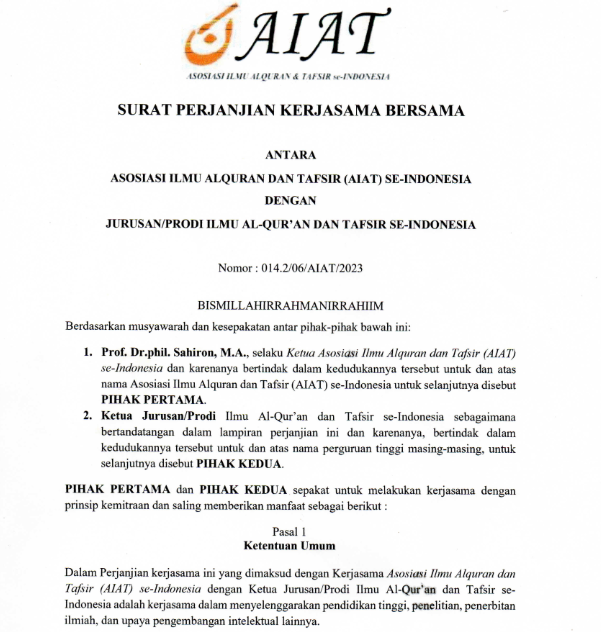The Sustainable Development Goal 2 Dalam Sudut Pandang At-Tikrār fĭ al-Qur’ān
 Abstract views: 15
,
Abstract views: 15
,
Abstract
SGDs that have been introduced for many years, have several goals for humans. The repetition of the words eat and drink in the Qur’an may correlated with Sustainable Development Goal 2 which is Zero Hunger to eliminate hunger, to achieve food and nutrition retention, and improving sustainable agriculture. The Qur'an that has existed from revelation will always be relevant in every era with its each context. The Qur'an will always be a guidence for every challenge of the changing times. The repetition of the word (tikrār) kulū wasyrabū in the Qur'an has a lot of wisdom and lot of teachings to be learned. The Interpretation of Tikrār of word Kulū Wasyrabū raises several concepts and values that could help the understanding of the context of sustainable food needs. This is a qualitative and library research with its primary and secondary data and delivered in a descriptive narration which explains the goals of Sustainable Development Goal 2: No Hunger, and explains the tikrār verses in the Qur'an, explains concepts, values and its implementation in every day life to provide a great opportunity in realizing the zero hunger goal.
Downloads
References
Afshin, Ashkan, Patrick John Sur, Kairsten A. Fay, Leslie Cornaby, Giannina Ferrara, Joseph S. Salama, Erin C. Mullany, et al. “Health Effects of Dietary Risks in 195 Countries, 1990–2017: A Systematic Analysis for the Global Burden of Disease Study 2017.” The Lancet 393, no. 10184 (2019): 1958–72. https://doi.org/10.1016/S0140-6736(19)30041-8.
Abdurahman, Bin, and Abdullah bin Muhammad Ishaq. “Lubaabut Tafsiir Min Ibni Katsiir I,” Cetakan 2., 1–518. Bogor: Pustaka Imam asy-Syafi’i, 2003.
Agus Salim Syukran, Agus Salim Syukran. “Fungsi Al-Qur’an Bagi Manusia.” Al-I’jaz : Jurnal Studi Al-Qur’an, Falsafah Dan Keislaman 1, no. 2 (2019): 90–108. https://doi.org/10.53563/ai.v1i2.21.
Al-Sabt, Qawaid Al-Tafsir Jam’an Wa Dirasatan Juz 1, Kairo: Dar ibn Affan, 2000
Amalia, I., Riandi, R., & Surtikanti, H. K. (2024). Kajian Literature: Penerapan Project Based Learning terkait Tujuan Pembangunan Berkelanjutan Poin 2 untuk Meningkatkan Kemampuan Berpikir Kreatif dan Kolaborasi Siswa. Jurnal Jeumpa, 11(1), 63-74.
Az-Zuhaili, Wahbah. Tafsir Al-Munir. Edited by Dkk Penerjemah: Abdul Hayyie al Kattani. 1st ed. Jakarta: Gema Inssani, 2003.
Cucu Nur Hayati, “Analisis Pengulangan Ayat Dalam Surat Inna Fi Żālika La Āyah Wamā Kāna Akṡaruhum Mu’minīn Dalam Surat Al-Syu’arā,” 2020, hal. 37
Dasmarianti. “Kaidah Al-Tikrar Dalam Al-Qur’an.” Tafasir 1, no. 1 (2023): 68–84.
Hasbi ash-Shiddieqy, Tafsir Al-Qur’anul Majid An-Nuur Semarang: Pustaka Rizki Putra, 2000
Health Effects of Dietary Risks in 195 Countries, 1990–2017: A Systematic Analysis for the Global Burden of Disease Study 2017’, The Lancet, 393(10184)(19), pp. 58–72, doi: 10.1016/S0140-6736(19)30041-8
Jalaluddin al-Suyuti, Al-Itqan Fi Ulum Al-Qur’an, jilid 3 Kairo: Dar al Fikr, 2008
Khalid ibn ’Utsman Al-Sabt, Qawaid Al-Tafsir Jam’an Wa Dirasatan. Dar Ibn Affan, n.d.
Muhammad bin Abdillah al-Zarkasyi, Al-Burhān Fi Ulum Al-Quran Kairo: Daar al-Turas, 2007
Muhammad Ma’sum bin Ali, Amtsilatut Tahrifiyah (Surabaya: Salim Nabhan, n.d.), hal. 13
Pangestu, F. P., Rahmadianti, N. S., Hardiyanti, N. T., & Yusida, E. (2021, June). Ekonomi Pancasila Sebagai Pedoman Dalam Tujuan Pembangunan Berkelanjutan SDGs (Sustainable Development Goals) 2030. In Prosiding Seminar Nasional Ekonomi Pembangunan (Vol. 1, No. 3, pp. 210-219).
M. Fuadi, Abdul Baqi. “Mu’jam Mufaros Li Al Fadzi Al-Qur’an.” Mesir: Dar-rul kutub misriyah, 2009.
Saputri, Widya, Wahyu Andryan, and Khodijah Ismail. “Kelompok 2- Pembangunan Berkelanjutan Sdgs 2030; Zero Hunger (Goal2)-Pertemuan 10.” ResearchGate, no. Goal 2: zero hunger, kelaparan (2021). https://doi.org/10.13140/RG.2.2.27974.60489.
Selvitri, Selvitri. “Pembangunan Berkelanjutan Tujuan 2 : Mencapai Nol Kelaparan.” Ilmu Dan Teknologi Kemaritiman, Fakultas Ekonomi,Universitas Maritim Raja Ali Haji, no. June (2021): 8–10.
Shihab, M Quraish. Tafsir Al-Mishbah: Pesan, Kesan, Dan Keserasian Al-Quran Surah Al-Fatihah-Surah Al-Baqarah. Tafsir Al-Misbah. Jakarta: Lentera Hati, 2002.
Sporchia, Fabio, Marta Antonelli, Alicia Aguilar-Martínez, Anna Bach-Faig, Dario Caro, Kyle F. Davis, Roberta Sonnino, and Alessandro Galli. “Zero Hunger: Future Challenges and the Way Forward towards the Achievement of Sustainable Development Goal 2.” Sustainable Earth Reviews 7, no. 1 (2024). https://doi.org/10.1186/s42055-024-00078-7.
Supriyanto, Sodik. Tikrār Dalam Al- Qur’an (Analisis Pengulangan Kata Kulū Wasyrabū Dalam Al- Qur’an). Edited by Skripsi Sodik Supriyanto. Pekalongan: UIN. KH. Abdurrahaman Wahid, 2024. https://www.bing.com/ck/a?!&&p=fe1d127184dddbe2JmltdHM9MTcyMzkzOTIwMCZpZ3VpZD0yZWI5OTE2MC05N2ZkLTY2YTQtMTA5Yy04NTQwOTZhYjY3YzEmaW5zaWQ9NTI0Nw&ptn=3&ver=2&hsh=3&fclid=2eb99160-97fd-66a4-109c-854096ab67c1&psq=sodik+supriyanto&u=a1aHR0cDovL2V0aGVzZXMudWluZ3VzZHVyLmFjLmlkLzgwNTYv&ntb=1.
Tanjung, Alwin Tanjung. “Keistimewaan Tikrar Al-Qur’an.” Al-Kauniyah 3, no. 2 (2023): 108–22. https://doi.org/10.56874/alkauniyah.v3i2.1136.
Umam, Khoirul, Labibah Dian Umami, and Nabila Roghba Sa’dati. “Islamisasi Konsep Sustainable Development Goals 2 : Zero Hunger.” INNOVATIVE: Journal Of Social Science Research 3, no. 5 (2023): 10804–20.
Wakefield, Benjamin, Anneke Schmider, Frini Chantzi, and Osman Dar. “Facilitating Progress towards SDG2: Zero Hunger.” Royal Institute of International Affairs, no. February 2022 (2022). https://typeset.io/papers/facilitating-progress-towards-sdg2-zero-hunger-21acbfiq%0Ahttps://policycommons.net/artifacts/2256720/facilitating-progress-towards-sdg2/3015426/.
Wiranto, Agung, “Konsep Pembangunan Berkelanjutan Dalam Al-Qur’an”
(7 Desember 2018), https://bincangsyariah.com/kolom/konsep-sustainable-development-dalam-alquran/ , diakses pada 1 Juli 2024.
Wepo, Pola Konsumsi dalam Islam: Perspektif Al-Qur’an tentang Kebijakan Konsumsi yang Berkelanjutan (IAI An-Nur Lampung, 2023). https://an-nur.ac.id/esy/category/artikel, diakses pada 1 Juli 2024.
The journal operates an Open Access policy under a Creative Commons Non-Commercial Share-Alike license. All articles published Open Access will be immediately and permanently free for everyone to read and download.
• Creative Commons Attribution-NonCommercial (CC-BY-NC)

Revelatia: Jurnal Ilmu al-Qur`an and Tafsir by http://ejournal.iainmadura.ac.id/index.php/revelatia is licensed under a Creative Commons Attribution-NonCommercial 4.0 International License.
Based on a work at http://ejournal.iainmadura.ac.id.




















